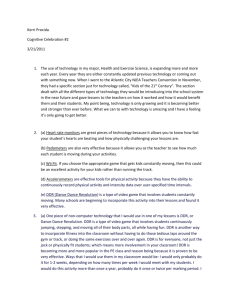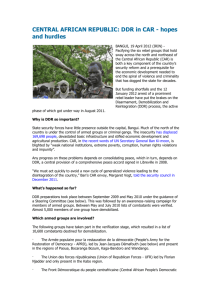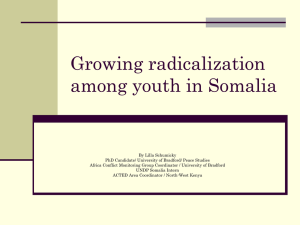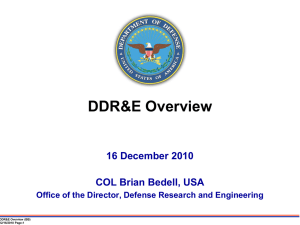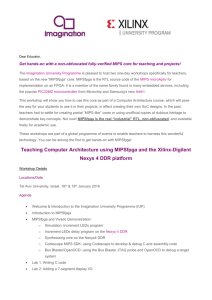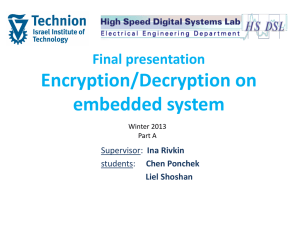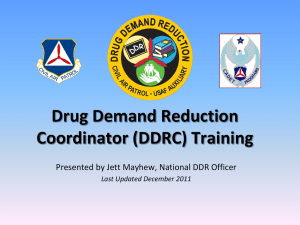Consultations with Michael Zorick, December 3rd 2004
advertisement
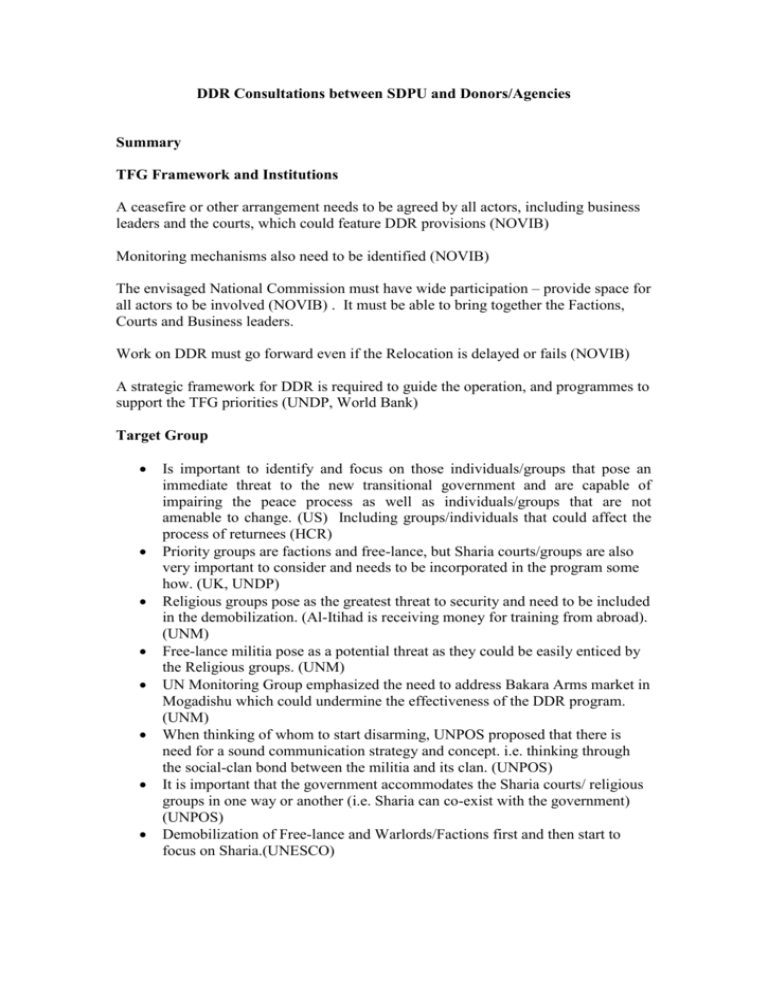
DDR Consultations between SDPU and Donors/Agencies Summary TFG Framework and Institutions A ceasefire or other arrangement needs to be agreed by all actors, including business leaders and the courts, which could feature DDR provisions (NOVIB) Monitoring mechanisms also need to be identified (NOVIB) The envisaged National Commission must have wide participation – provide space for all actors to be involved (NOVIB) . It must be able to bring together the Factions, Courts and Business leaders. Work on DDR must go forward even if the Relocation is delayed or fails (NOVIB) A strategic framework for DDR is required to guide the operation, and programmes to support the TFG priorities (UNDP, World Bank) Target Group Is important to identify and focus on those individuals/groups that pose an immediate threat to the new transitional government and are capable of impairing the peace process as well as individuals/groups that are not amenable to change. (US) Including groups/individuals that could affect the process of returnees (HCR) Priority groups are factions and free-lance, but Sharia courts/groups are also very important to consider and needs to be incorporated in the program some how. (UK, UNDP) Religious groups pose as the greatest threat to security and need to be included in the demobilization. (Al-Itihad is receiving money for training from abroad). (UNM) Free-lance militia pose as a potential threat as they could be easily enticed by the Religious groups. (UNM) UN Monitoring Group emphasized the need to address Bakara Arms market in Mogadishu which could undermine the effectiveness of the DDR program. (UNM) When thinking of whom to start disarming, UNPOS proposed that there is need for a sound communication strategy and concept. i.e. thinking through the social-clan bond between the militia and its clan. (UNPOS) It is important that the government accommodates the Sharia courts/ religious groups in one way or another (i.e. Sharia can co-exist with the government) (UNPOS) Demobilization of Free-lance and Warlords/Factions first and then start to focus on Sharia.(UNESCO) DDR Approach The Addis Seminar on stabilizing Somalia during the transition showed a number of possible directions for the TFG with regard to security, including DDR. (US) Current Somali thinking must be developed and made more credible (US) Successful demilitarization in Somalia would largely depend on reconciliation within the government and between the government and other key actors, and must go hand in hand with these efforts. (US) (NOVIB) It is important to link the DDR program to confidence building and reconciliation, at regional and local levels. (Sweden) UNDP is not a palliative for all security concerns in Somalia and will need to be coupled with work on the security sector, and in other areas, to be successful. (UNDP) Must emphasize ownership of the DDR process; Somalis should be involved in formulating the framework to ease implementation. Supported a bottom up approach. (Sweden) Needs to be voluntary, military approaches do not appear to be feasible in the Somali context (US) Must involve civil society, traditional leaders and others in the dialogue process. Timing and Sequence An opinion was offered that an incremental approach to demobilization in Somalia (particularly if reconciliation has not been achieved) would be the most feasible. This would entail dealing first with the most problematic/dangerous group (s) and trying to get them registered while also attempting to get everyone behind the incremental approach. Incremental demobilization would be taking place while reconciliation continues and other things are unfolding. A bottom-up/grassroots approach was encouraged, whereby local NGOs would be working with the communities to scale down the problem by at least 30%/40%. (US) Awareness raising Awareness raising on DDR could be coupled with building local capacities, support to local institutions, civic education activities, etc. (NOVIB) Awareness raising could be through poetry (Hadrowi), peace marches, and schools for peace inititiatives. Registration vs. encampment UNHCR felt that, from its encampment experience in Hargeisa and elsewhere, encampment is not a good option because: - Negative connotation of “camp”, i.e. signifies isolation and lack of respect - - Maintenance of camp too expensive (i.e. encampment in Kenya $ 40- $50 per refugee/year and costs would double in Somalia as transport, security, support costs double) Re-creates situation of dependency Expectations on land issue Removing the militia from their power base into camps is not a guarantee that the government would get control and be able to function. In retrospect of lessons learnt from elsewhere in the world, Sweden felt that encampment creates new problems and cautioned against this method. UNHCR appeared to be more in favour of a decentralized approach to DDR than encampment as it would be much cheaper, feasible and flexible. UNPOS felt that a decentralized, bottom-up approach to DDR would be more feasible, flexible and cheaper. UNESCO noted that the TFG had tried encampment but it was short lived. Little potential for DFID funds to be used for encampment. UNPOS discouraged the approach of encampment, noting that it is very expensive and that UNISOM had tried this method but failed to succeed. Demobilisation through Integration of Forces Sweden was of the opinion that the National Army should be established in parallel to the DDR program and felt that reviving the old SNA army is not such a good idea as it could impede the demobilization process. Integration could also include community policing groups, such as “community watch”. Disarmament A useful tool/strategy to consider for DDR would be to use personal pride as leverage; i.e. giving up one’s weapon as a way of saving face. Also using U.S. as leverage. (US) UNESCO is sceptical of the cash-buy-back approach to DDR and perceives it to be irresponsible. Some thought that heavy weapons must be dealt with first, before DDR (NOVIB) No buy back (NOVIB) Issue of Amnesty It would not be prudent to bring up the issue of Amnesty at this point in time as it would put the Somalis on strong guard. Nonetheless, the idea of limited amnesty is viable; i.e. after a certain date those who continue to violate will not receive amnesty. (UK) Views on amnesty vary; nonetheless a legal framework on the matter needs to be established. A more pragmatic approach on the issue of amnesty at this point in time is feasible. (HCR) UN Monitoring Group is against the notion of blanket amnesty and feels that should the perpetrators continue to violate the arms embargo then their amnesty should be taken away. The debate process on Amnesty should start from the parliament. (POS) A legal technical advisor could assist to put the issue of amnesty into Somali context/specificities. (POS) Supported a more pragmatic approach (i.e. within the transition, suggest that all crimes are amnestied) (POS) Reintegration of ex-combatants Sweden recommended a developmental approach on re-integration. Potential funding/ support to DDR program No potential funding/support for DDR. The U.S. has no role to play in DDR in Somalia and perceives that that the TFG is ultimately responsible for creating security in Somalia. However, U.S. would support a strong and feasible plan that is owned by the TFG. Potential funding available, especially for re-integration. (UK) Potential support for DDR program exists, especially in re-integration. (HCR) It is possible that psycho-social activities by UNHCR together with other partners and agencies could extend to other areas in Somalia to assist combatants. As well, UNHCR is currently undertaking rehabilitation programs in Somalia that could include combatants. Creating a legal framework in Somalia (i.e. ceasefire accord/arrangement) that would encompass the commitments that parties need to make. For instance, a National Peace Council could act as a watchdog.(UNM) DDR program would be conditioned on disarmament (UNM) Some potential funding for DDR. UNPOS has a Peace Building Trust Fund amounting to $ 3.6 Million which has not yet been disposed, but qualifies for DDR. In the near future UNPOS plans to transform its office to focus its activities mainly on peace building,that includes DDR. As a result, UNPOS will have a DDR officer who would provide technical support on DDR. Potential support (Re-integration). UNESCO could emphasize its role on reintegration in the overall DDR program. Funds amounting to 300,000 Euros are expected and UNESCO plans to initiate a DDR program in south and central Somalia which will work on 150 people. (UNESCO has run a DDR program in Mogadishu and Puntland, similar to that of UNDP). UNESCO is trying to re-integrate 10% of the non-militia/community so as to ensure that everyone benefits as much as possible. No potential for funding but potential support for DDR program exists, specifically in re-integration. Traditionally, USAID does not support DDR programs. However there could be some links between USAID activities in Somalia and DDR program, particularly in re-integration of combatants. For instance, USAID has programs running in primary education, community development and rehabilitating schools, mostly in the North region of Somalia. Training of traditional/religious leaders activities could include the issue of DDR awareness raising (NOVIB/Habitat) Outreach and information can be both gathered and extended through existing civil society networks (NOVIB) Capacity building could also cover DDR issues in sector focussed training such as for agriculture etc. Potential independently managed DDR is planned (NOVIB) Trauma counselling networks could be brought to bear to assist in the return process for combatants (NOVIB w/UNICEF) Micro-credit activities could supplement DDR reintegration packages (NOVIB)
